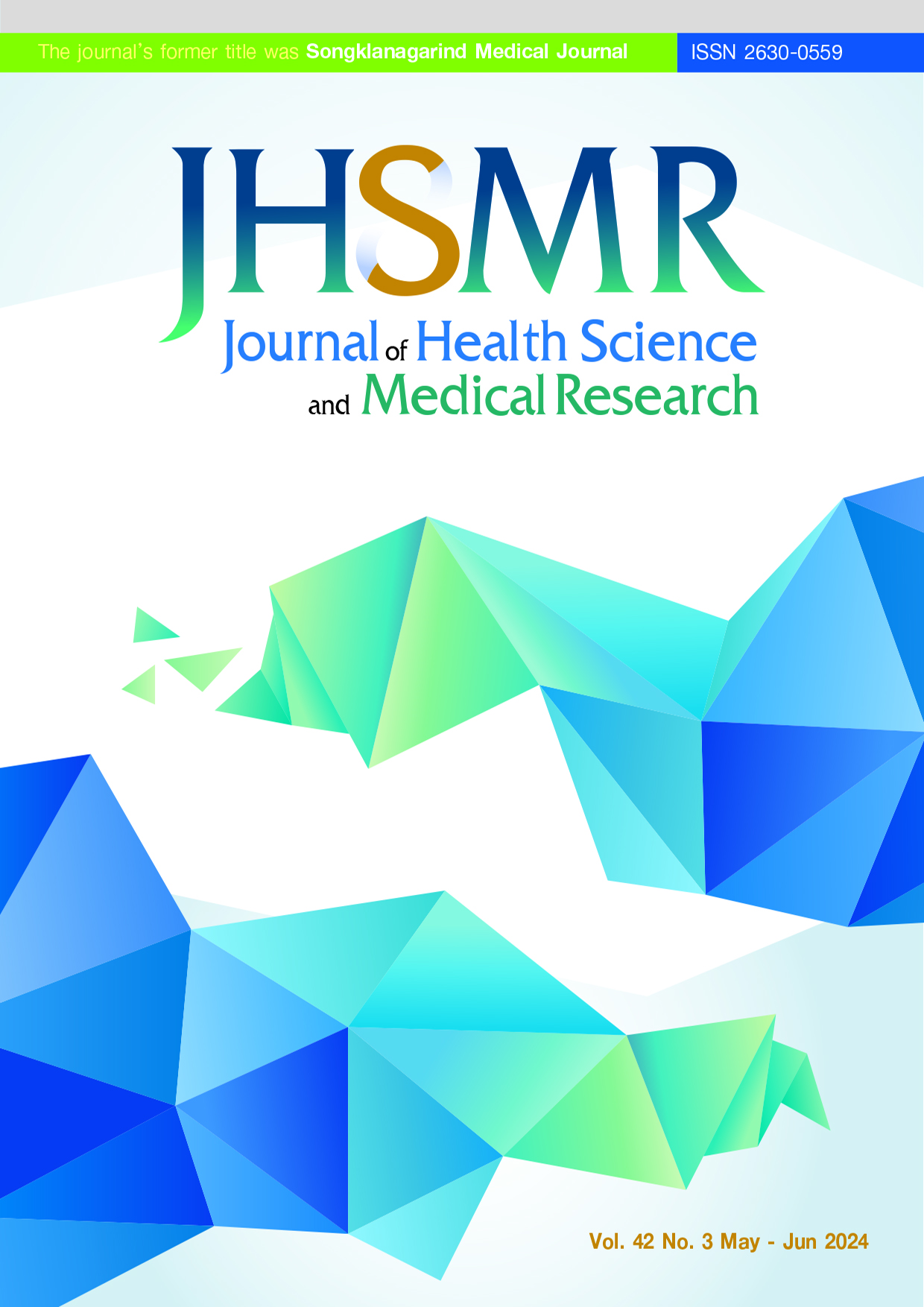Association Between Periodontal Pathogens and Severity of Periodontal Diseases Among Adolescents in Kunming City: China
DOI:
https://doi.org/10.31584/jhsmr.20241029Keywords:
periodontal diseases, periodontal pathogens, P. gingivalis, risk factorsAbstract
Objective: To investigate the association between periodontal pathogens and periodontal status among adolescents in Kunming City.
Material and Methods: A total of 560 adolescents from five high schools within five urban districts in Kunming participated in this study. Clinical periodontal examination was assessed, and the levels of Porphyromonas gingivalis (P. gingivalis), Aggregatibacter actinomycetemcomitans (A. actinomycetemcomitans), Prevotella intermedia (P. intermedia), and Fusobacterium nucleatum (F. nucleatum) in saliva samples were examined using a real-time polymerase chain reaction (PCR). The relationship between periodontal pathogens and the severity of periodontal disease was investigated using multivariate logistic regression analysis.
Results: The presence of P. gingivalis, A. actinomycetemcomitans, and P. intermedia was positively correlated with the extent of probing depth, clinical attachment level (CAL), and bleeding on probing. P. gingivalis and A. actinomycetemcomitans were detected at approximately 55-58% among adolescents with healthy periodontal status. P. gingivalis and A. actinomycetemcomitans were detected in all adolescents diagnosed with periodontitis (stage I or II), which was an increased number compared to healthy adolescents. It was found that P. gingivalis (odd ratio (OR)=7.03, 95% confidence interval (CI) 3.77-13.11) and A. actinomycetemcomitans (OR=5.37, 95% CI 2.73-10.57) were strongly associated with stage II periodontitis. F. nucleatum had no significant relationship with the occurrence of gingivitis and periodontitis.
Conclusion: P. gingivalis, A. actinomycetemcomitans, and P. intermedia are important microbiological risk factors for periodontal diseases in adolescents.
References
American Academy of Periodontology-Research, Scicence and therapy Committee. Periodontal diseases of children and adolescents. Pediatr Dent 2008;30:240-7.
Loe H, Morrison E. Periodontal health and disease in young people: screening for priority care. Int Dent J 1986;36:162-7.
Page RC, Kornman KS. The pathogenesis of human periodontitis: an introduction. Periodontol 2000 1997;14:9-11.
Dhar V, Jain A, Van Dyke TE, Kohli A. Prevalence of gingival diseases, malocclusion and fluorosis in school-going children of rural areas in Udaipur district. J Indian Soc Pedod Prev Dent 2007;25:103-5.
Zhang M, Lan J, Zhang T, Sun W, Liu P,Wang Z. Oral health and caries/gingivitis-associated factors of adolescents aged 12-15 in Shandong province, China: a cross-sectional oral health survey. BMC Oral Health 2021;21:1-8.
Xu J, Naorungroj S, Pahumunto N, Teanpaisan R. Prevalence and associated factors of caries and periodontal diseases among adolescents in Kunming: a cross-sectional study. J Health Sci Med Res 2023;41:e2022903
Albandar JM. Global risk factors and risk indicators for periodontal diseases. Periodontol 2000 2002;29:177-206.
Socransky SS, Haffajee AD, Cugini MA, Smith C, Kent Jr RL. Microbial complexes in subgingival plaque. J Clin Periodontol 1998;25:134-44.
Haffajee AD, Socransky SS. Microbial etiological agents of destructive periodontal diseases. Periodontol 2000 1994;5:78-111.
Ledder RG, Gilbert P, Huws SA, Aarons L, Ashley MP, Hull PS, et al. Molecular analysis of the subgingival microbiota in health and disease. Appl Environ Microbiol 2007;73:516-23.
Parahitiyawa NB, Scully C, Leung WK, Yam WC, Jin LJ, Samaranayake LP. Exploring the oral bacterial flora: current status and future directions. Oral Dis 2010;16:136-45.
Hajishengallis G, Darveau RP, Curtis MA. The keystonepathogen hypothesis. Nat Rev Microbiol 2012;10:717-25.
Papapanou PN, Sanz M, Buduneli N, Dietrich T, Feres M, Fine DH, et al. Periodontitis: Consensus report of workgroup 2 of the 2017 world workshop on the classification of periodontal and peri-implant diseases and conditions. J Periodontol 2018;89:173-82.
Manmontri C, Nirunsittirat A, Piwat S, Wattanarat O, Pahumunto N, Makeudom A, et al. Reduction of Streptococcus mutans by probiotic milk: a multicenter randomized controlled trial. Clin Oral Investig 2020;24:2363-74.
Slots J, Ting M. Actinobacillus actinomycetemcomitans and Porphyromonas gingivalis in human periodontal disease: occurrence and treatment. Periodontol 2000 1999;20:82-121.
Timmerman MF, Van der Weijden GA, Armand S, Abbas F, Winkel EG, Van Winkelhoff AJ, et al. Untreated periodontal disease in Indonesian adolescents. Clinical and microbiological baseline data. J Clin Periodontol 1998;25:215-24.
Alghamdi AS, Almarghlani AA. Periodontal pathogenic bacteria among high school children in Saudi Arabia. Ann Saudi Med 2019;39:244-50.
Papapanou PN, Baelum V, Luan WM, Madianos PN, Chen X, Fejerskov O, et al. Subgingival microbiota in adult Chinese: prevalence and relation to periodontal disease progression. J Periodontol 1997;68:651-66.
Papapanou PN, Teanpaisan R, Obiechina NS, Pithpornchaiyakul W, Pongpaisal S, Pisuithanakan S, et al. Periodontal microbiota and clinical periodontal status in a rural sample in southern Thailand. Eur J Oral Sci 2002;110:345-52.
Boutaga K, van Winkelhoff AJ, Vandenbroucke-Grauls CM, Savelkoul PHM. The additional value of real-time PCR in the quantitative detection of periodontal pathogens. J Clin Periodontol 2006;33:427-33.
Masunaga H, Tsutae W, Oh H, Shinozuka N, Kishimoto N, Ogata Y. Use of quantitative PCR to evaluate methods of bacteria sampling in periodontal patients. J Oral Sci 2010;52:615-21.
Lau L, Sanz M, Herrera D, Morillo JM, Martín C, Silva A. Quantitative real-time polymerase chain reaction versus culture: a comparison between two methods for the detection and quantification of Actinobacillus actinomycetemcomitans, Porphyromonas gingivalis and Tannerella forsythensis in subgingival plaque samples. J Clin Periodontol 2004;31:1061-9.
Kuboniwa M, Amano A, Kimura KR, Sekine S, Kato S, Yamamoto Y, et al. Quantitative detection of periodontal pathogens using real-time polymerase chain reaction with TaqMan probes. Oral Microbiol Immunol 2004;19:168-76.
Meng S, Zhao L, Yang H, Wu Y, Ouyang Y. Prevalence of Actinobacillus actinomycetemcomitans in Chinese chronic periodontitis patients and periodontally healthy adults. Quintessence Int 2009;40:53-60.
Umeda M, Contreras A, Chen C, Bakker I, Sots J. The utility of whole saliva to detect the oral presence of periodontopathic bacteria. J Periodontol 1998;69:828-33.
Boutaga K, Savelkoul PH, Winkel EG, van Winkelhoff AJ. Comparison of subgingival bacterial sampling with oral lavage for detection and quantification of periodontal pathogens by real-time polymerase chain reaction. J Periodontol 2007;78:79-86.
He J, Huang W, Pan Z, Cui H, Qi G, Zhou X, et al. Quantitative analysis of microbiota in saliva, supragingival, and subgingival plaque of Chinese adults with chronic periodontitis. Clin Oral Investig 2012;16:1579-88.
Bolstad AI, Jensen HB, Bakken V. Taxonomy, biology, and periodontal aspects of Fusobacterium nucleatum. Clin Microbiol Rev 1996;9:55-71.
Downloads
Published
How to Cite
Issue
Section
License

This work is licensed under a Creative Commons Attribution-NonCommercial-NoDerivatives 4.0 International License.
























